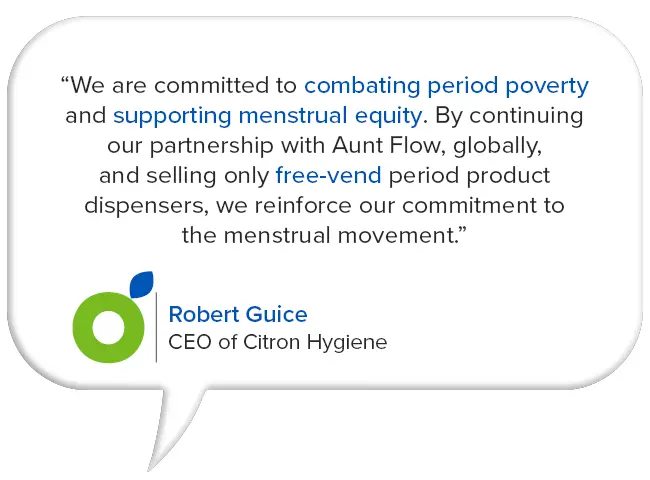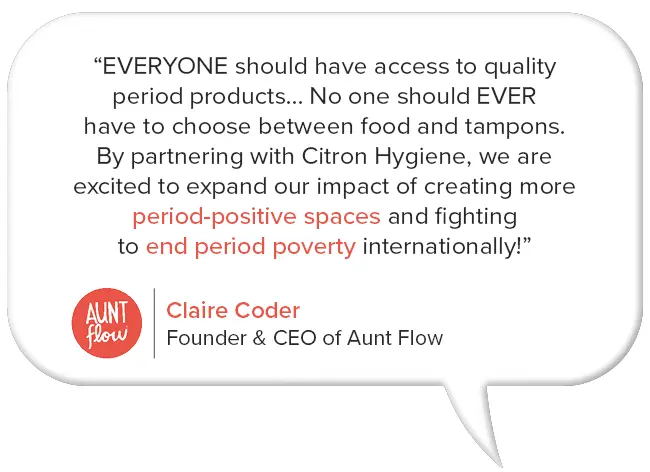


A Period Dignity Award-winning washroom provides a safe and hygienic place for people who menstruate. By providing touch-free, hygienic, in-cubicle sanitary bins and free period products, we can create an environment that is welcoming to menstruators! No one should have to miss work, school, or other critical activities due to their period. Yet, that’s exactly what happens when people don’t have access to menstrual products. That’s why Citron Hygiene and Aunt Flow are working to change the world for people with periods by ensuring menstruators have access to high-quality, organic tampons and pads. As a result, menstruators can reach their full potential. And that’s something we can all get behind.









Period poverty is the lack of access to period products and education. We believe fighting period poverty is one of the most tangible steps we can take toward gender equality. Read More
When it comes to periods, everyone deserves equitable access to menstrual products and education. Unfortunately, period poverty and stigma are still major problems in many parts of the world. Menstrual equity is the idea that everyone should have the same opportunities and resources when it comes to managing their periods. This includes access to safe and affordable menstrual products, as well as accurate information about reproductive health. By tackling these issues head-on, we can help to improve the lives of people who menstruate all over the world. In addition, menstrual equity can also help to challenge the negative stereotypes and myths that surround periods. By normalising menstruation, we can create a more inclusive society for all.
Organize menstrual product drives and fundraisers in your community to collect and donate pads and tampons to local shelters and food pantries. Lead educational workshops in your community about menstruation, sustainable menstrual products, and destigmatizing menstruation. Apply pressure to policymakers, decision-makers, and local leaders, advocating for policies that improve access to menstrual products and education. Ask your school to include menstruation and menstrual health as part of the educational curriculum. In fact, 77% of students believe there needs to be more in-depth education about menstrual health.
2. Conduct and support more peer-reviewed research assessing the prevalence and health implications of period poverty. This data is important for supporting more grassroots advocacy efforts. Urge schools and businesses to invest in high-quality menstrual products free of cost for everyone
We recommend stocking every female-identified, all-gender, and male-identified bathroom with period supplies. For male-identified bathrooms, we do not recommend installing our dispensers in visible places inside male-identified restrooms. Privacy creates safe spaces for the transgender community. Aunt Flow’s Model E Dispenser or the Citron Hygiene/Aunt Flow display box should be placed in the designated stall in the male-identified restroom. A sanitary hygiene bin will also need to be provided in this stall.
If your business or school offers toilet paper for free, then advocate to your facilities department to prioritize budgeting for freely accessible period products too. When dispensers are first installed in bathrooms, there could be higher than normal usage, which then levels out over time once people learn that period products are not just a one-time luxury item but will be available on an ongoing basis
The cost of providing a Period Dignity Washroom depends on several factors. If you outsource sanitary hygiene waste disposal to Citron Hygiene, the cost will depend on service frequency and the number of bins in your facility. Additionally, the cost of providing pads and tampons will depend on your foot traffic, service frequency (if you outsource stocking of products), and the number of washrooms that you provide period products in.